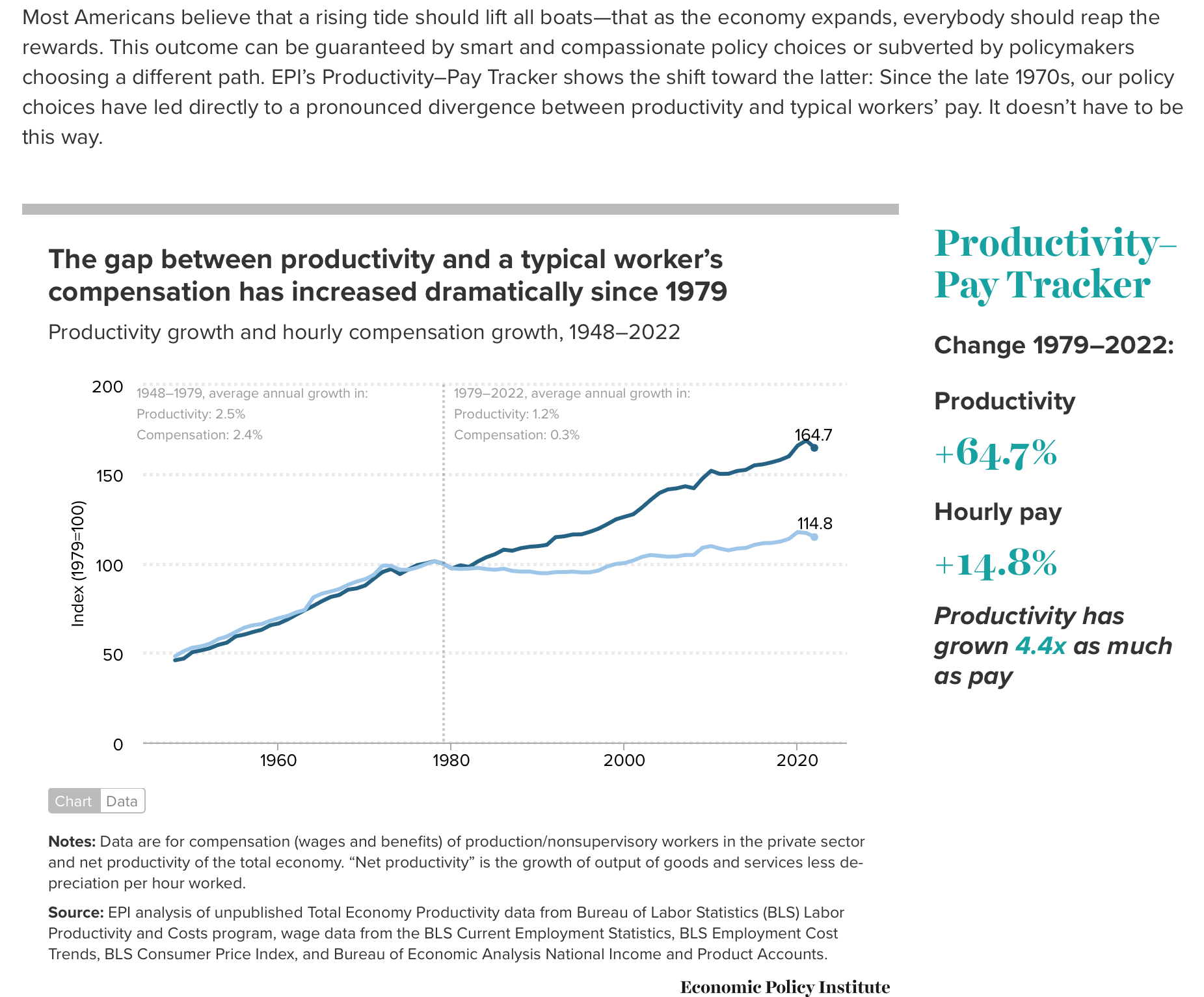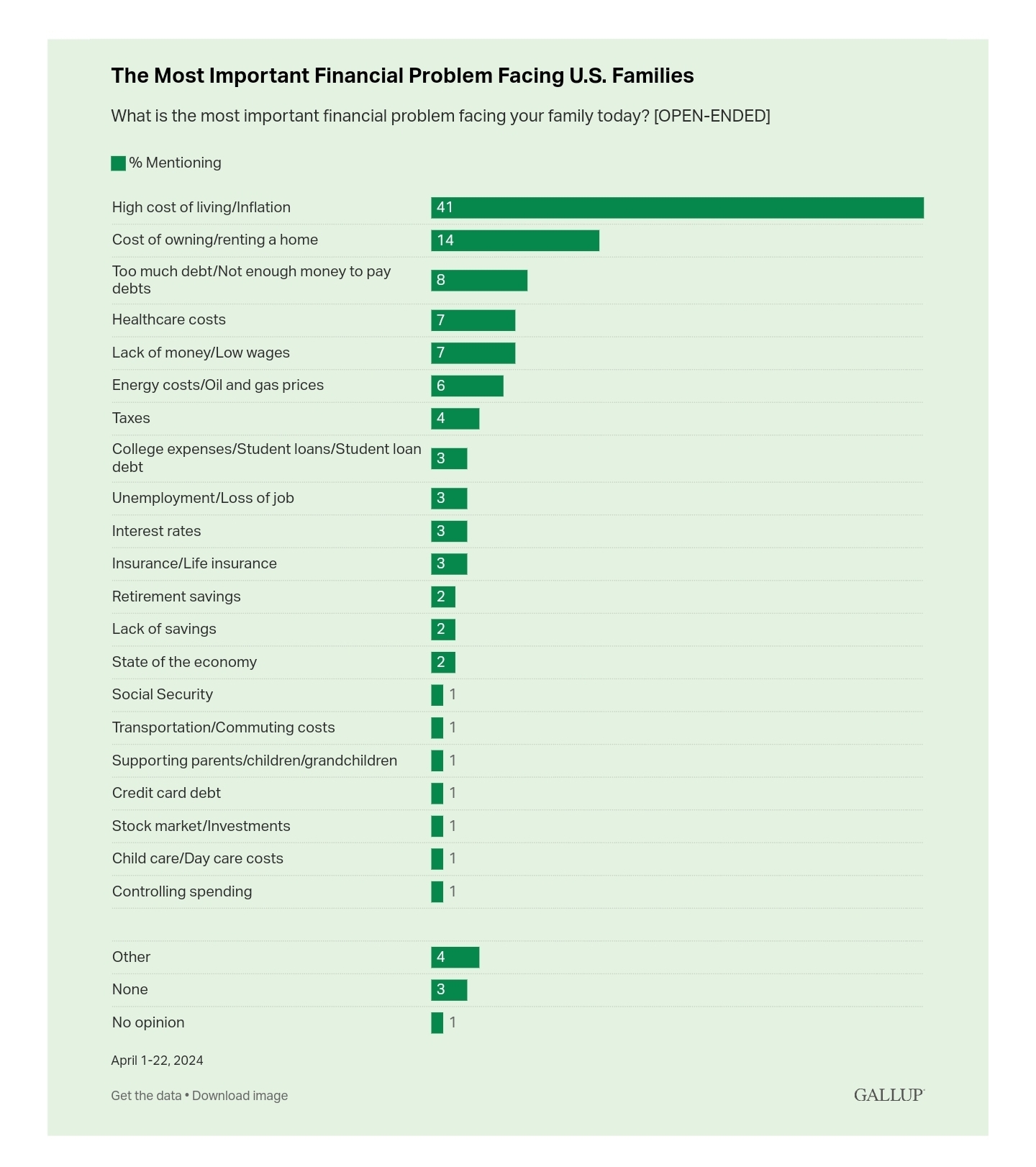And the problem is that even if it goes back to 2%, it’s still fresh in everyone’s memory that CPI was 17.5% lower (1$ March 2020 = 1.21$ March 2024) and it’s not very fair to the average person that the number they hear only compares to the previous year when it’s not what they’re feeling in their wallet as there’s never been deflation.
What I’m saying is, we know when the high inflation period started, media should report both the year-on-year change and inflation compared to a specific month before the last major economy influencing event, that would help people understand the information presented to them and why it feels like prices are still up much more than 3%.
The media reports it that way because the guys who run the economy report it that way. We need an inflation tracker website that tracks the divergence of wages from inflation like the conservatives have for the national debt.
inflation would not be a problem if wages went up as well.
Wages are always and forever blamed on inflation, despite lagging inflation year after year after year.
That’s the thing with greed: they find many names for it to distract from them personally. East the rich. But get on with it already.
And then you think about it and you’re like “If inflation goes up X% and all wages need to go up the same amount in order for people to keep up, why is inflation necessary again?”
There’s an economic argument for steady inflation as a counterweight against compound interest and debt.
Inflation creates an economic incentive for productive investment. I’d rather own a $20 machine that generates $1/year of new valuable goods/services than a $20 bill in a vault, because the goods/services will inflate in value while the cash will not. And if I don’t have $20, I’ll be willing to borrow it if the value of the debt declines over time while the value of my annual production rises.
When wages match inflation rates and surplus cash can be productively invested, each new participant in the economy has an opportunity to grow their personal fortunes over time.
However, when wages lag inflation, only the early adopters get to see the benefits of new productivity. Old money compounds faster than new wage earn investment enters the pool. And eventually you get a Berkshire Hathaway / Goldman Sachs / Blackrock / Citadel style superfund that owns a significant percentage of virtually everything.
The same thing happens in deflation. People with access to cheap credit or liquid currency (banks, mostly) can horde capital while wages contract. And then, again, you end up with an economy in which a handful of feudal aristocrats hold the titles on all the properties.
But when wages grow faster than inflation, you see the reverse. Earners can buy into property at a steady discount, while investment of new properties promise higher yields than simply sitting on old capital stock indefinitely.
There’s an economist named Thomas Piketty who breaks it down thoroughly in Capitalism in the 21st Century, detailing why you want the economic growth of your national economy (G) to exceed the rate of return on investment (R) if you care about reducing overall economic inequality.
That’s fine and all, and I wish it were so. We just live in an economic reality that has been steadily increasing the inequality with consequences such as unaffordable housing, healthcare, and education.
Inflating the debt away is advantageous only if the TCO keeps up. In this case the wealthy get the lion’s share of inflationary increases while many people only see modest cost of living offsets that for two years fell behind inflation. We seldom see years where employers give a cost of living adjustment above the current inflationary rate beyond the current year index, to make up for prior years where they didn’t.
E.g. I see a job posting from 2007 that advertised 65k/year, in the same company with the same role they currently only compensate that same role at about 73k. $65k from 2007 equates to approximately $97k in today’s money. If things were truly equitable and commensurate, and I realize this is an isolated data sample, but it appears to be a common trend across the country.
For the numbers, that’s $24k of income that would be really great to have today.
E.g. I see a job posting from 2007 that advertised 65k/year, in the same company with the same role they currently only compensate that same role at about 73k. $65k from 2007 equates to approximately $97k in today’s money. If things were truly equitable and commensurate, and I realize this is an isolated data sample, but it appears to be a common trend across the country.
I absolutely agree. And I’m willing to bet that the profit at that same firm has only grown over time. So here we have a classic case in which profit margins have outpaced the real volume growth at this firm, making it less efficient and more expensive to operate as a result.
For the numbers, that’s $24k of income that would be really great to have today.
Oh sure. Numbers get even worse when you consider how that $24k of income is buying even less housing, health care, and utilities than it did in 2007, and for all the same reasons.
As profit margin eclipses real growth, the real economy is subsumed by fictitious assets.
why is inflation necessary again?
stock market go brrr
If a company makes less profit than last quarter, no matter how many billions in profit that actually comes out to or how satisfied the customers are with the company’s products, investors will be sad and the line will go down. If a company makes more profit than last quarter, the line goes up regardless of if that growth is actually sustainable long term because that’s not our problem right now. All that matters is we can tell investors we had record profits this quarter, the executives get to take home their million dollar bonuses, and the line doesn’t go down until after those execs leave for even greener pastures.
So, a company can’t just be good at what it does at the scale that it does it, it must grow constantly like a cancerous tumor in order to stay attractive to investors. When people are flush with cash you squeeze it out of them as fast as you possibly can because, again, the future doesn’t matter right now and anyways they’ll just give it to someone else if you don’t take it first. Sell products that don’t last very long so the customer keeps coming back. Raise prices and cut staff when times are anything less than stellar but never under any circumstances lower prices or give workers more than the lowest amount it takes to keep them working, because that means less profit which means the line will go down which means the execs don’t get their bonuses and that is a fate worse than death.
Year 1 inflation: “We wanted to make sure your raise kept up.” Year 2: “We’re a fledgling company!”
It wouldn’t be a problem if the government wasn’t addicted to printing money like a dope fiend.
Found the Diapers Over Dems, corporations are people, and school shootings aren’t a problem dude.


“High cost of living/Inflation” so not simply “Inflation”
Also, when would that ever not be the top category? “Things cost too much” seems like kind of a supercategory covering most of the others. Maybe “lack of money” could compete.
The top is less important than the ratio. The top 2 answers are basically stuff costs too much. Over half the people are claiming that is their biggest problem. If times were better, it still might be the top, but it shouldn’t be the majority. Debt concerns, and retirement would take a bigger chunk.
rent gauging. wildly insane property values. gas price gauging. it’s not just food prices, tho that sucks too
I think I understand what you are saying (about the title, ya?), buy are they not connected somehow?
Cost of living might be always high, not increasing much every year
Inflation is the rate of increase
Thanks.
Actually I’m really confused with how that list is done.
Retailers jacked up prices and squeezed consumers. They might have just blinked I hope consumers still don’t bat many eyelashes because capitalism best practices def looked to squeeze consumers. Record profits, stock markets riding high, rich got even richer, meanwhile ever more people struggle up and down ‘main street’.
That’s okay, because eventually we’re just going to automate away the need for all those struggling people. And then we won’t care if they participate in the economy anymore. We can… ahem… zero them out.
We’re witnessing this process in areas like Yemen, Palestine, and Kashmir as we speak. If you get under the hood of MBS’s 30 year plan for Saudi Arabia, you’ll notice a sharp drop in the expected demand for labor. This, from a man who doesn’t bat an eye at walking a guy into an embassy and dismembering him with a chainsaw.
Go ask Andreessen Horowitz or Peter Thiel or Bill Gates what they’d like to see happen to the human population going into the 22nd century, and you’ll get similar speculative responses.
you would think money would be the primary financial issue.
last i checked nobody likes it. Weird how we still pretend like it’s other shit.
They must have a lot of savings
You realize that inflation not only tends to exceed raises, raises go into effect on a typically yearly schedule while inflation does not, yes?
Do I look like I know basic economics?
No.
That’s not the news you want it to be. First of all I’ve seen this breathlessly reported several times with bad data. The revised data comes out and repeatedly gives inflation the win. Second, even if we did come out as a wash this year, there’s still a 10 percent gap just between wages and Inflation in just the last few years. And a ~130 point gap since the mid 1970’s. So put the party hats down, we still have work to do.
Well, it is great that we have the good people of Lemmy to correct the economists from the Bureau of Labor Statistics and the banks then. Wouldn’t want fake news.
You didn’t read my comment then. It’s the journalists reading the data they want rather than the actual data.









